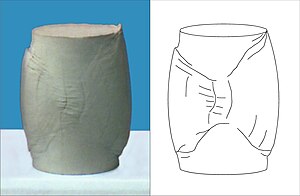剪切带 (材料工程)

此条目翻译自其他语言维基百科,需要相关领域的编者协助校对翻译。 |
剪切带(shear band)是材料中一个狭窄的强剪切应变区,通常在延性材料严重变形时出现,具有可塑性。剪切带会比材料的其他部位先失去韧性,剪切带中发生的极端变形可能导致材料严重的损坏和断裂,因此研究剪切带如何形成是一个对材料应用非常重要的课题,20世纪中叶以来变形局部化(localization of deformation)一直被密集研究。
有剪切带的材料
[编辑]剪切带或更普遍的“局部变形”通常会在广义的延展性材料(合金、金属、颗粒材料、塑料、聚合物和土壤)甚至在准脆性材料(混凝土、冰、岩石和一些陶瓷)中发生,脆性材料(例如室温下的玻璃)中则无法观察到剪切带。
数学建模
[编辑]剪切带是影响材料不稳定性的因素,使固体样品突然丧失变形均匀性(homogeneity of deformation),即使其受力的传力路径(loading path)与持续均匀变形兼容。从这个意义上说,它可以被解释为一种“替代”微不足道的变形机制,因此是分叉或失去“完美”均衡路径的唯一性。这种分叉的显着特征是它甚至可能发生在无限体中(或在与刚性约束平滑接触的极端约束下)。
考虑一个由非线性材料组成的无限体,它以一种应力和应变可能保持均匀的方式准静态变形。为简单起见,假设这种非线性材料的增量反应为线性,因此它可以表示为应力增量之间的关系和应变增量 ,通过一个四阶本构张量表示为
其中四阶本构张量取决于当前状态,即当前应力、当前应变以及可能的其他本构(该物质特性)参数(例如金属的硬化变量或颗粒材料的密度)。 寻找出现不连续面的条件(单位法向量 ) 的增量应力和应变。这些条件与发生变形局部化的条件相同。特别是,增量平衡要求增量牵引力(不是应力!)保持连续
(其中 + 和 - 表示表面的两侧)和几何兼容性对增量应变的形式施加了应变兼容性限制:
符号表示张量积和是定义变形不连续模式的向量(正交于对于不可压缩材料)。将增量本构定律(1)和应变相容性(3)代入增量牵引(2)的连续性,得出应变定位的必要条件:
由于二阶张量定义每个向量为
这是所谓的“声学张量”(acoustic tensor),定义了加速度波的传播条件,我们可以得出结论,应变局域化条件与加速度波的奇异性(零速传播)条件一致。该条件代表了控制速率平衡的微分方程的所谓“椭圆度(扁率)损失”。
剪切带和晶体结构
[编辑]大多数多晶体金属或合金会因为差排、孪晶或剪切带引起剪切变形,导致它们的塑性在晶粒尺度上各方向不同,因此造成多数晶粒具有类似的结晶方位,此现象被称为结晶织构,大部分面心立方金属和合金的冷轧织构介于黄铜型织构和铜型织构两种类型之间。堆垛层错(Stacking-fault energy,原子堆叠次序发生差错)是此机制的影响因素之一,高堆垛层错的面心立方金属中,主要是差排的滑移促使织构形成;低堆垛层错、有机械孪晶(晶格受力滑移导致的双晶)和剪切带的金属与合金中,织构则与做为主要载体的差排滑移一起产/发生。
在任何一种情况下,非晶体剪切带(non-crystallographic shear banding)对于演化出的特定类型的变形纹理都起着至关重要的作用。 [1] [2]
微扰方法与检测
[编辑]可以通过微扰方法研究剪切带的形成(包括在样本处于变形状态且未受干扰的情况下叠加扰动场的情况)[3][4],可以通过叠加集中力、制造裂纹或借由刚性线夹杂物(Rigid line inclusion)来扰动检测样本。本方法适合应用于无限、不可压缩、非线性弹性、在平面应变条件下均匀变形的材料。
已经发现,当样本的未扰动状态接近定域条件(4)时,扰动场会以定域场的形式自排列,在引入的扰动附近呈现极值并沿着剪切带聚焦方向。在裂纹或刚性线状夹杂物的情况下,这种剪切带会从线状夹杂物的尖端显现。 [5]
在微扰方法中,引入了有限长度剪切带的增量模型[6]以规定沿其表面的以下条件:
- 零增量标称剪切牵引力;
- 增量标称法向牵引力的连续性;
- 法向增量位移的连续性。
使用该模型,剪切带的以下主要特征已得到证明:
- 类似于断裂力学,应力/变形场中的平方根奇点在剪切带尖端发展;
- 在剪切带存在的情况下,应变场是局部的并且强烈地集中在平行于剪切带的方向上;
- 由于与剪切带增长相关的能量释放率在局部条件(4)附近爆炸到无穷大,因此剪切带代表优先失效模式。
最新研究
[编辑]根据相关实验[7][8][9][10]、理论[11][12][13][14][15][16][17][18][19],以及材料的力学数学模型(即本构模型 constitutive models),目前已经可以对剪切带进行很好的定性预测,然而定量预测的技术通常很差[20]。
数据模拟大有进步[21][22][23][24],使剪切带的形成和传播的数据在相对复杂的情况下还是可以用有限元模型(finite element models)追踪,尽管需要巨大的计算工作。
更令人感兴趣的是剪切带的模拟,从中可以研究剪切带在单晶或多晶材料中的晶体取向依赖性(crystallographic orientation dependence)情况如何。目前的研究结果表明,某些方向比其他方向更容易发生剪切定位[25]。
参见
[编辑]参考资料
[编辑]- ^ Jia, N.; Roters, F.; Eisenlohr, P.; Raabe, D.; Zhao, X. Simulation of shear banding in heterophase co-deformation: Example of plane strain compressed Cu–Ag and Cu–Nb metal matrix composites. Acta Materialia (Elsevier BV). 2013, 61 (12): 4591–4606. ISSN 1359-6454. doi:10.1016/j.actamat.2013.04.029.
- ^ Jia, N.; Eisenlohr, P.; Roters, F.; Raabe, D.; Zhao, X. Orientation dependence of shear banding in face-centered-cubic single crystals. Acta Materialia (Elsevier BV). 2012, 60 (8): 3415–3434. ISSN 1359-6454. doi:10.1016/j.actamat.2012.03.005.
- ^ Bigoni, D. and Capuani, D. (2002) Green's function for incremental nonlinear elasticity: shear bands and boundary integral formulation. Journ. Mech. Phys. Sol. 50, 471-500.. [2021-07-31]. (原始内容存档于2020-08-18).
- ^ Bigoni, D. and Capuani, D. (2005) Time-harmonic Green's function and boundary integral formulation for incremental nonlinear elasticity: dynamics of wave patterns and shear bands. Journ. Mech. Phys. Sol. 53, 1163-1187.. [2021-07-31]. (原始内容存档于2020-08-18).
- ^ Dal Corso F. and Bigoni D. (2009) The interactions between shear bands and rigid lamellar inclusions in a ductile metal matrix. Proc. R. Soc. Lond. A, 465, 143-163.. [2021-07-31]. (原始内容存档于2020-08-18).
- ^ Bigoni, D. and Dal Corso, F. (2008) The unrestrainable growth of a shear band in a prestressed material. Proc. R. Soc. Lond. A, 464, 2365-2390.. [2021-07-31]. (原始内容存档于2020-08-18).
- ^ Knodel, PC; Drescher, A; Vardoulakis, I; Han, C. A Biaxial Apparatus for Testing Soils. Geotechnical Testing Journal (ASTM International). 1990, 13 (3): 226-234. ISSN 0149-6115. doi:10.1520/gtj10161j.
- ^ Desrues, J.; Lanier, J.; Stutz, P. Localization of the deformation in tests on sand sample. Engineering Fracture Mechanics (Elsevier BV). 1985, 21 (4): 909–921. ISSN 0013-7944. doi:10.1016/0013-7944(85)90097-9.
- ^ Vardoulakis, I. Rigid granular plasticity model and bifurcation in the triaxial test. Acta Mechanica (Springer Science and Business Media LLC). 1983, 49 (1-2): 57–79. ISSN 0001-5970. doi:10.1007/bf01181755.
- ^ Poirier, C.; Ammi, M.; Bideau, D.; Troadec, J. P. Experimental study of the geometrical effects in the localization of deformation. Physical Review Letters (American Physical Society (APS)). 1992-01-13, 68 (2): 216–219. ISSN 0031-9007. doi:10.1103/physrevlett.68.216.
- ^ Bigoni, D. Nonlinear Solid Mechanics: Bifurcation Theory and Material Instability. Cambridge University Press, 2012. ISBN 9781107025417.
- ^ Rudnicki, J.W.; Rice, J.R. Conditions for the localization of deformation in pressure-sensitive dilatant materials (PDF). Journal of the Mechanics and Physics of Solids (Elsevier BV). 1975, 23 (6): 371–394 [2021-07-31]. ISSN 0022-5096. doi:10.1016/0022-5096(75)90001-0. (原始内容 (PDF)存档于2021-07-31).
- ^ Thomas, T.Y. (1961) Plastic flows and fracture of solids. Academic Press, New York.
- ^ Rice, J. R. (1977) The localization of plastic deformation. In Koiter, W.T., ed., Theoretical and Applied Mechanics. Amsterdam, North-Holland. 207-220.. [2021-07-31]. (原始内容存档于2021-07-24).
- ^ Bigoni, Davide; Hueckel, Tomasz. Uniqueness and localization—I. Associative and non-associative elastoplasticity. International Journal of Solids and Structures (Elsevier BV). 1991, 28 (2): 197–213. ISSN 0020-7683. doi:10.1016/0020-7683(91)90205-t.
- ^ Biot, M.A. (1965) Mechanics of incremental deformations. New York, Wiley.
- ^ Hill, R. Acceleration waves in solids. Journal of the Mechanics and Physics of Solids (Elsevier BV). 1962, 10 (1): 1–16. ISSN 0022-5096. doi:10.1016/0022-5096(62)90024-8.
- ^ Mandel, J. (1962) Ondes plastiques dans un milieu indéfini à trois dimensions. J. de Mécanique 1, 3-30.
- ^ Nadai, A. (1950) Theory of flow and fracture of solids. McGraw-Hill, New York.
- ^ Gajo, A., Bigoni, D. and Muir Wood, D. (2004) Multiple shear band development and related instabilities in granular materials. J. Mech. Phys. Solids 52, 2683-2724.. [2021-07-31]. (原始内容存档于2020-08-18).
- ^ Leroy, Y.; Ortiz, M. Finite element analysis of transient strain localization phenomena in frictional solids. International Journal for Numerical and Analytical Methods in Geomechanics (Wiley). 1990, 14 (2): 93–124. ISSN 0363-9061. doi:10.1002/nag.1610140203.
- ^ Petryk, H.; Thermann, K. Post-critical plastic deformation in incrementally nonlinear materials. Journal of the Mechanics and Physics of Solids (Elsevier BV). 2002, 50 (5): 925–954. ISSN 0022-5096. doi:10.1016/s0022-5096(01)00131-4.
- ^ Nacar, A.; Needleman, A.; Ortiz, M. A finite element method for analyzing localization in rate dependent solids at finite strains. Computer Methods in Applied Mechanics and Engineering (Elsevier BV). 1989, 73 (3): 235–258. ISSN 0045-7825. doi:10.1016/0045-7825(89)90067-4.
- ^ Loret, Benjamin; Prevost, Jean H. Dynamic strain localization in elasto-(visco-)plastic solids, Part 1. General formulation and one-dimensional examples. Computer Methods in Applied Mechanics and Engineering (Elsevier BV). 1990, 83 (3): 247–273. ISSN 0045-7825. doi:10.1016/0045-7825(90)90073-u.
- ^ Jia, N.; Roters, F.; Eisenlohr, P.; Kords, C.; Raabe, D. Non-crystallographic shear banding in crystal plasticity FEM simulations: Example of texture evolution in α-brass. Acta Materialia (Elsevier BV). 2012, 60 (3): 1099–1115. ISSN 1359-6454. doi:10.1016/j.actamat.2011.10.047.












